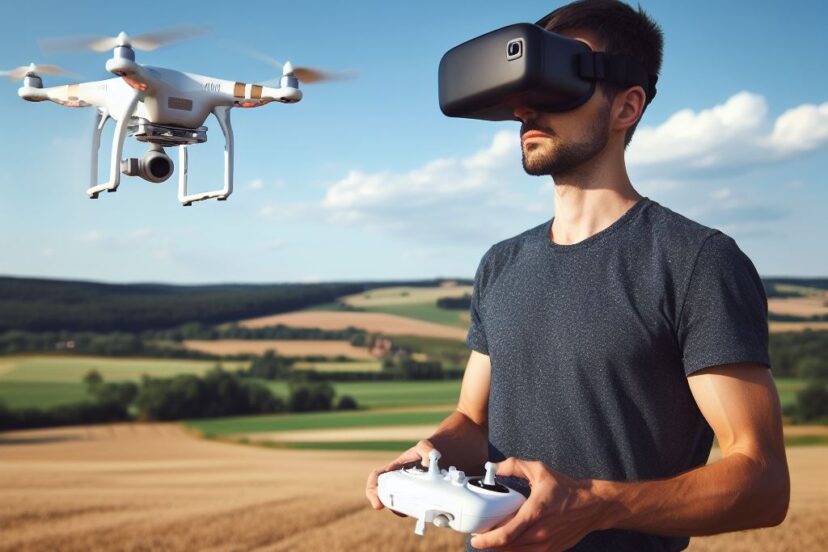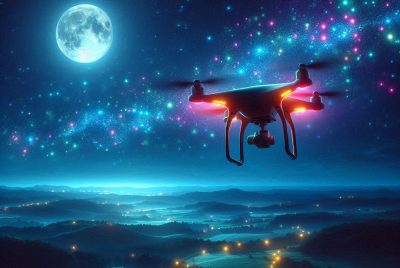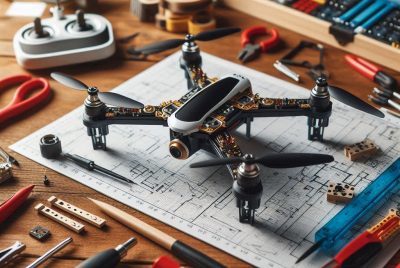Drone Operator Jobs: Exploring the Skies and Careers
*We may earn a commission for purchases made using our links. Please see our disclosure to learn more.
Drone Operator Jobs: Navigating Career Opportunities in UAV Piloting
In the evolving job market, drone operator jobs are gaining significance with the expanding use of unmanned aerial vehicles (UAVs). I understand that UAVs have permeated a myriad of industries, from aerial photography and delivery services to agricultural monitoring and infrastructure inspection, thus driving demand for skilled operators. As a drone operator in the United States, I must navigate a set of FAA regulations and possibly obtain certification, ensuring that I can pilot drones responsibly and safely.

My experience demonstrates that drone operation is not just about flying the craft; it requires knowledge of aerial systems, weather patterns, and data collection techniques. Opportunities in the drone industry range from freelance gigs to full-time positions, with remuneration potentially varying between $100 to over $250 per hour depending on the level of expertise and the complexity of the job.
Staying current with technology advances and industry standards is crucial for drone operators to remain competitive. As new applications for drones emerge, I recognize that a continuous investment in developing my skills is necessary. Whether I’m capturing stunning aerial images or conducting critical search and rescue missions, my role as a drone operator is an integral part of the UAV’s promising future in the workforce.
Becoming a Drone Operator

In my journey to become a drone operator, I’ve learned the importance of proper education and certification alongside the development of specific skills sets essential for the role.
Education and Certification
I obtained my certification as a drone pilot through the Federal Aviation Administration (FAA). The FAA Part 107 certification is mandatory for operating commercial drones in the United States. The process involves the following steps:
- Age: I confirmed that I was at least 16 years old.
- English Proficiency: Demonstrated the ability to read, speak, write, and understand English.
- Health: Passed an aeronautical knowledge exam to ensure I was physically and mentally fit to operate a drone safely.
- Knowledge Exam: Studied for and passed the FAA’s knowledge test, which covers various topics including airspace classification, flight restrictions, weather, and drone operations.
| FAA Knowledge Test Topics | Details |
| Airspace Classification | Understanding different classes of airspace and flight restrictions. |
| Weather | Interpreting weather conditions that affect drone flight. |
| Drone Operations | Knowledge of pre-flight checks and maintenance procedures. |
To maintain my credentials, I participate in ongoing professional development to stay abreast of the ever-evolving regulations in aviation and drone technology.
Required Skills
Becoming a proficient drone operator goes beyond just handling the controls; it includes a mix of technical skills and soft skills. Some of the skills I honed are:
- Technical Skills:
- Robotics: Gained an understanding of the mechanics behind drone operations.
- Attention to Detail: Ensured meticulous pre-flight checks and flight path planning.
- Aviation Knowledge: Deepened my aviation knowledge to make informed decisions during unmanned aerial systems operations.
- Soft Skills:
- Communication Skills: Developed clear communication to effectively coordinate with clients, team members, and airspace authorities.
- Leadership: Learned to take initiative and lead projects confidently as a remote pilot operator.
By combining these skill sets with my certified pilot status, I positioned myself as a knowledgeable professional in the field of drone operation.
Drone Operator Opportunities

Drone operators are in demand across various industries, leveraging the technology for tasks ranging from detailed mapping to infrastructure inspection. I find that understanding the industry-specific applications and the regional demand for drone expertise can significantly influence career opportunities.
Industries and Applications
Drones have revolutionized several industries by offering an efficient, safer, and often more cost-effective way to collect data and carry out tasks that once were more labor-intensive. In real estate, drones provide a unique perspective for showcasing properties, offering aerial videography and photography to highlight features that traditional methods cannot. In the construction sector, drones play a crucial role in site surveys and inspections, improving safety and efficiency on the job site.
The energy industry relies on drones for the inspection of power lines and other utility infrastructures, reducing the need for human technicians to work in hazardous conditions. Likewise, in the geospatial field, technicians now use drones for mapping and surveying, offering detailed topographical data with greater coverage and accuracy. Here’s a brief glimpse of the roles drones fill across these sectors:
- Real Estate: Aerial photography for property listings
- Construction: Site surveying and progress monitoring
- Energy: Utility inspections, maintenance checks
- Mapping: Creation of detailed maps for various applications
Geographical Demand
The need for skilled drone operators is on the rise across the United States, with certain regions showcasing more opportunities based on local industries and regulatory environments. I focus my attention on cities like Dallas and Austin, TX, where the tech and real estate markets demand innovative drone applications. Syracuse, NY, and nearby Ticonderoga, NY, also exhibit a growing need for drone expertise in their local industries. In contrast, Ronkonkoma, NY, seems to have a budding drone operations industry.
- Dallas, TX: High-tech and construction industries with a growing drone market
- Austin, TX: Progressive tech hub, real estate, and creative media applications
- Syracuse, NY: Emerging drone technology sector
- Ronkonkoma, NY: Developing opportunities in various drone applications
Some locations, such as Iowa, present unique agricultural applications where drones are used for crop monitoring and management, highlighting the versatility of drone operations across different geographical landscapes.
The key to tapping into the drone industry is recognizing where the demand aligns with one’s passion and expertise. By staying updated on industry trends and regional demands, I can position myself at the forefront of this dynamic and growing field.
Drone Operator Jobs: Types and Contracts
In my experience, the scope of opportunities for drone operators is diverse and can accommodate various preferences for work arrangements, from traditional full-time positions to more flexible contract roles.
Employment Classifications
Full-Time:
- Definition: I consider full-time employment to typically involve a structured schedule, often requiring at least 40 hours per week.
- Benefits: This classification usually includes employee benefits such as healthcare.
Part-Time:
- Definition: Part-time positions require fewer hours than full-time and can range widely.
- Advantages: These roles offer flexibility and may suit individuals who are pursuing certifications or further education.
Temporary:
- Definition: Temporary jobs have a set duration and often support specific projects.
- Note: I’ve noted these roles can be a gateway to gaining industry experience.
Remote Pilot/Visual Observer:
- Remote Full-Time: Certain positions may allow me to operate drones remotely on a full-time basis.
- Visual Observer: This role often involves part-time or temporary work, assisting the pilot for safety and compliance.
Contract Work
Contract:
- Nature of Work: As a contractor, my work is project-based with the flexibility to choose engagements that align with my skills.
- Duration: The term ranges from a few days to several months.
Remote Pilot:
- Work Location: Contract positions may offer the chance to work remotely, requiring me to manage drones off-site.
Drone Pilot Test Engineer:
- Role: In contract roles, I apply my technical expertise to assess drone systems.
- Relevance: These positions are critical for maintaining the integrity and safety of drone operations.
Drone Operator:
- Contracts: My engagements vary but often include thorough agreements detailing job scope, payment, and duration.
- Payment: Rates can fluctuate based on expertise and the nature of the operation, perhaps $50 to $600 per day.
My utilities as a drone operator allow me to navigate the job market effectively, whether seeking traditional employment or the flexibility of contract work.
Drone Operator Jobs: Career Advancement

As a drone operator, advancing my career involves specializing in in-demand roles and committing to ongoing education. This ensures I stay ahead in a competitive and rapidly evolving industry.
Specialized Roles
UAS Flight Operator: By becoming a UAS flight operator, I focus on the operation of unmanned aircraft systems. This role often involves executing complex missions, requiring precision and skill.
LiDAR Pilot: I can specialize as a LiDAR pilot, using Light Detection and Ranging technology for mapping and surveying, which is highly sought after in geomatics.
Geomatics Specialist: In this role, I apply drone technology to collect and analyze geographic and spatial data, which can lead to significant advancements in various sectors like urban planning and environmental management.
Interceptor Systems Specialist: As an interceptor systems specialist, my job is to operate drones designed to secure airspace by identifying and neutralizing potential aerial threats.
Robotics Operator: I venture into robotics when I control drones capable of performing intricate tasks, such as repairs and inspections, which requires a blend of piloting skills and technical knowledge.
SUAS Flight Operator: Operating small unmanned aircraft systems is a segment where I can apply my skills for tasks that range from agricultural surveying to wildlife monitoring.
UAV Pilot: As a UAV pilot, my role is to safely navigate unmanned aerial vehicles for a variety of applications, including aerial photography, delivery services, and search and rescue operations.
Continuing Education
Professional Development: I invest in my professional development by attending workshops and seminars. This not only enhances my capabilities but also keeps me updated with the latest industry standards.
Certified Pilot: I pursue advanced certifications that validate my expertise. For instance, obtaining a certification as a geomatics specialist or as a licensed SUAS flight operator demonstrates my commitment to the field and opens up new career paths.
Industry Standards and Safety for Drone Operator Jobs

In my role as a drone operator, I can affirm that adherence to industry standards and comprehensive safety protocols are paramount. These ensure the consistent, legal, and secure use of unmanned aerial vehicles (UAVs), especially in applications like drone delivery and aviation where safety is critical.
Compliance and Legislation
I stay updated on the latest compliance requirements and legislation affecting UAV operations in the United States. The Federal Aviation Administration (FAA) sets forth regulations all drone pilots must follow to operate drones legally. For instance, the Part 107 rule outlines provisions for commercial drone pilots, including drone delivery operators. It covers operating requirements and the certification process mandatory for me to legally fly a drone for commercial purposes. My adherence to these rules ensures that my UAV operations align with national standards.
- FAA Part 107 certification: Mandatory for commercial drone pilots.
- Local regulations: Can vary; must be followed in addition to federal requirements.
- Privacy laws: Ensure UAVs do not infringe on individuals’ rights.
Safety Protocols
Safety is ingrained in every aspect of my operations as a drone pilot. A robust understanding and implementation of safety protocols protect not just the equipment, but also people and property on the ground. Before any flight, I conduct pre-flight checks to maintain the integrity of my drone. I ensure my UAV is in optimal condition, troubleshooting any potential issues to mitigate risks during flight. For drone delivery services, ensuring the safety of the payload and the operational environment is crucial.
- Pre-flight checks: Ensures the UAV is in proper working order.
- Maintenance schedule: Regularly scheduled, documents checks and repairs.
- Emergency procedures: Preparedness for unforeseen circumstances.
By meticulously following these regulations and safety measures, I contribute to the safety of the national airspace and the efficiency of UAV operations within the industry.
Drone Operator Jobs: Tools and Technologies

In my capacity as a drone operator, having a profound understanding of both software and hardware is essential. Proficiency in specific tools and technologies is a cornerstone for effectiveness in drone piloting and data collection tasks.
Software Proficiency
DroneDeploy: This is the platform I use for creating flight plans, capturing high-quality images, and processing data. It allows me to automate flights and gather data accurately for various applications.
Adobe Creative Suite: To edit the photos and videos recorded with my drone, I often use Adobe software. My skills with Adobe Photoshop and Premiere Pro enable me to enhance the visual output and create professional-grade media for clients.
Video Editing: The video editing process is a significant part of my job. It demands attention to detail and an understanding of storytelling to produce compelling aerial footage that serves the project’s goals.
Hardware Expertise
Drones: I’m well-versed in a variety of drones, including consumer-grade and industrial drones. I ensure that each drone, like a DJI Phantom or Mavic, is well-maintained and ready for any job.
Skycam: Sometimes, my projects call for stationary aerial cameras. I’m experienced in setting up and operating skycams for live events, providing a unique perspective for viewers.
Service Technician Skills: My technical knowledge comes in handy for routine maintenance and minor repairs. Being able to troubleshoot and resolve issues quickly keeps projects on schedule.
Data Collection Tools: Whether it’s for mapping, inspection, or surveying, I come equipped with sensors and tools required for collecting and storing accurate data.
In each assignment, the right mix of software and hardware expertise directly correlates with the quality of service I can offer as a drone pilot. Holding a valid driver’s license allows me to travel to diverse job locations, while my ability to communicate effectively in English ensures clear coordination with clients and teams.
FAQs About Drone Operator Jobs
In this section, I address common inquiries related to drone operator jobs, providing clarity on salaries, job search strategies, qualifications, career pathways, and industry trends.
1. What are the typical salary ranges for drone operator jobs?
Salaries for drone operator jobs vary widely depending on skill level and industry. As a beginner, I might earn between $60 and $200 per hour. An average salary in the insurance industry, for example, could be around $94,051.
2. How can I find drone operator job opportunities near me?
Job platforms like Glassdoor often list current openings for drone operators. Additionally, industry-specific online forums and UAV job boards can be valuable resources for finding opportunities close to my location.
3. What qualifications are required for entry-level drone pilot positions?
For entry-level drone pilot roles, I must obtain an FAA Tracking Number (FTN) by registering with the Integrated Airman Certification and Rating Application (IACRA). This number is essential for all subsequent certifications and applications.
4. Can you pursue a career as a drone pilot within the military?
Yes, the military offers careers for drone pilots. UAV pilots are needed for various missions, and such roles typically require me to be able to travel frequently as part of the job.
5. What training is necessary to become a professional drone operator?
To become a professional drone operator, I must undergo training to receive certification from the Federal Aviation Administration (FAA). This involves passing an aeronautical knowledge test and obtaining a Remote Pilot Certificate.




